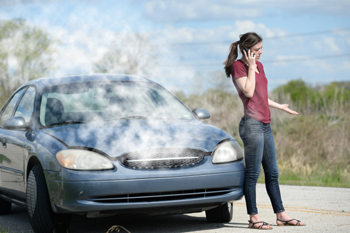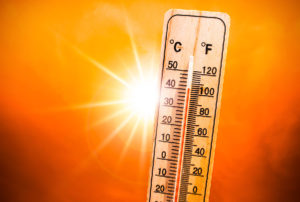Overheating is a more inconvenient problem. With many problems, you can jump your battery, or find a way to limp home. However, if your automobile is overheating, you need to shut it down and call a tow truck, or you could be looking at some really expensive consequences.
battery, or find a way to limp home. However, if your automobile is overheating, you need to shut it down and call a tow truck, or you could be looking at some really expensive consequences.
This is the worst case scenario when it comes to your vehicle overheating, but any time your engine’s temperature is rising higher than normal, it indicates that you’ve got some kind of engine cooling system issue. Ignoring an overheating issue is a big mistake, as overheating places tremendous stress on your engine. Left alone for too long, overheating can be the cause of significant damage or may even necessitate a full engine replacement. As you can probably guess, none of that is cheap.
Engine overheating can stem from a number of potential issues, some of which are easy to solve and others requiring a bit more maintenance work. The following is an overview of some of the reasons your car’s engine may be overheating and common fixes for those problems.
Engine Heat and Cooling System Basics
As you probably know, the engine generates tremendous heat as it works. If you’ve ever popped the hood and made the mistake of touching a part of the engine after driving it for a while, you know that even a properly cooled engine is significantly too hot to touch.
Engine Coolant System
In order to understand some of the most common causes of engine overheating, it’s good to get a sense for the basics of how an engine is cooled. Most modern automobiles use a liquid cooling system to reduce heat as the engine runs and heats up. In a liquid cooling system, coolant (generally a mixture of water and anti-freeze) is circulated through the engine to absorb heat, and then channeled to the radiator to vent that heat.
Leaking Cooling System
One of the more common problems leading to an engine overheating is a leak within the coolant system. A leak can occur at nearly any point in the cooling system chain of components – radiator, head gasket, water pump, the hoses, or even the thermostat housing.
If there’s a leak in your vehicle’s cooling system, this allows air to enter the system. It’s a misconception that a leak in the cooling system causes your car to overheat because significant amounts of coolant leak out. The more common problem is that air enters the cooling system and eventually forms a bubble of air known as ‘airlock’.
Blocked Coolant Hoses and Contaminated Coolant
Coolant hoses can sometimes become choked with sediment and dirt from the breakdown and erosion of coolant or metallic cooling system components. When this happens, it impedes the flow of coolant, which decreases the overall efficiency of your engine cooling system. If the build-up of grime and dirt becomes too significant, it can lead to the engine overheating because the coolant can’t move through the hoses.
Similarly, that grime permeating into your coolant system dilutes and adulterates the coolant itself. Flecks of rust, dirt and other road or plastic based particles can accrue in the coolant, causing it to be less efficient at absorbing and channeling engine heat.
Radiator Issues
The radiator is responsible for venting engine heat into the atmosphere through the coolant in the system. In order for the radiator to function properly, a number of conditions must exist.
First, the radiator needs to be free from leaking or clogging. We discussed the possibility of a coolant leak earlier, and similar to a clogged hose, the radiator can develop an obstruction, which doesn’t allow coolant to efficiently pass into and out of the radiator.
A Faulty Water Pump
The water pump is responsible for propelling coolant throughout the entire cooling system. Anything that reduces the function of the water pump will result in poor coolant circulation, which in tern will lead to engine overheating.
Lim’s Auto Body is a full service auto body and mechanical repair shop locally owned and operated in Largo, Florida. For more information, go to our web site www.limsautobody.com or call (727) 422-3232.

 have problems, very often you have lost your freon.
have problems, very often you have lost your freon.